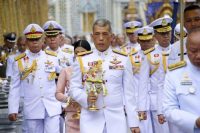
The Thai Establishment Strikes Back
In early September, Bangkok witnessed an odiferous spectacle. Kneeling on a white mat and dressed in a full hazmat suit and gas mask, Duangrit Bunnag, a prominent Thai architect and public commentator, invited onlookers to pelt him with cow dung. Many of them obliged, allowing Duangrit to fulfill a promise that he had not expected to have to keep. Earlier this year, he had pledged to his followers on social media that if his preferred political party, Pheu Thai, forged an alliance with one of Thailand’s military-backed parties, he would subject himself to this scatological ordeal. Much to his surprise (and likely horror), Pheu Thai did just that over the summer, reneging on commitments the party had made ahead of elections in the spring.… Seguir leyendo »
















